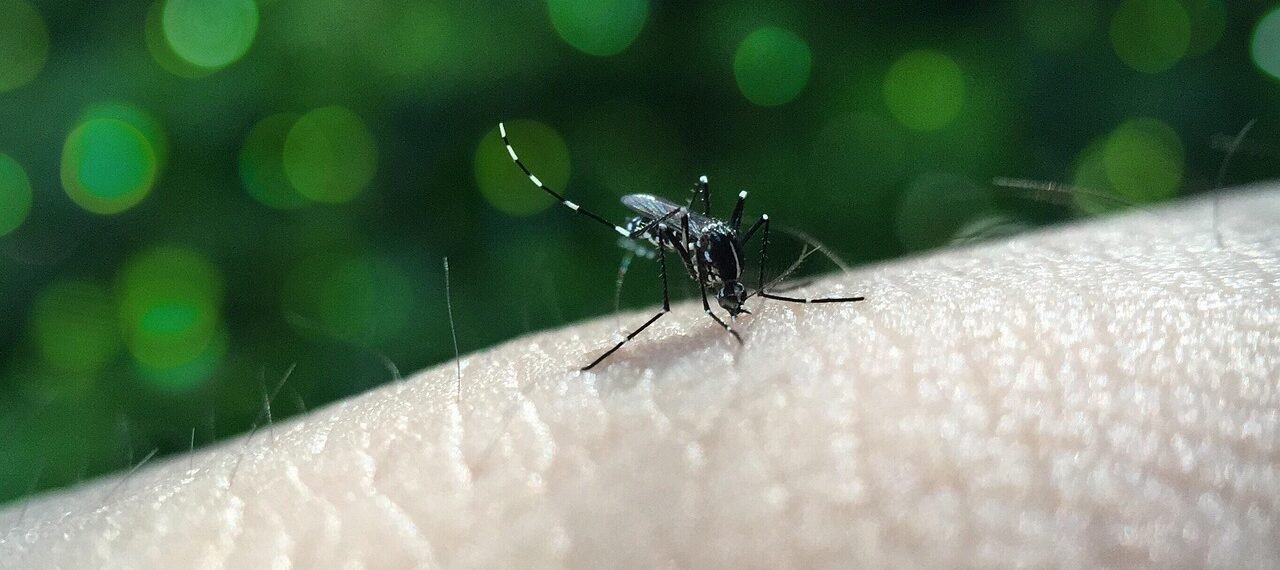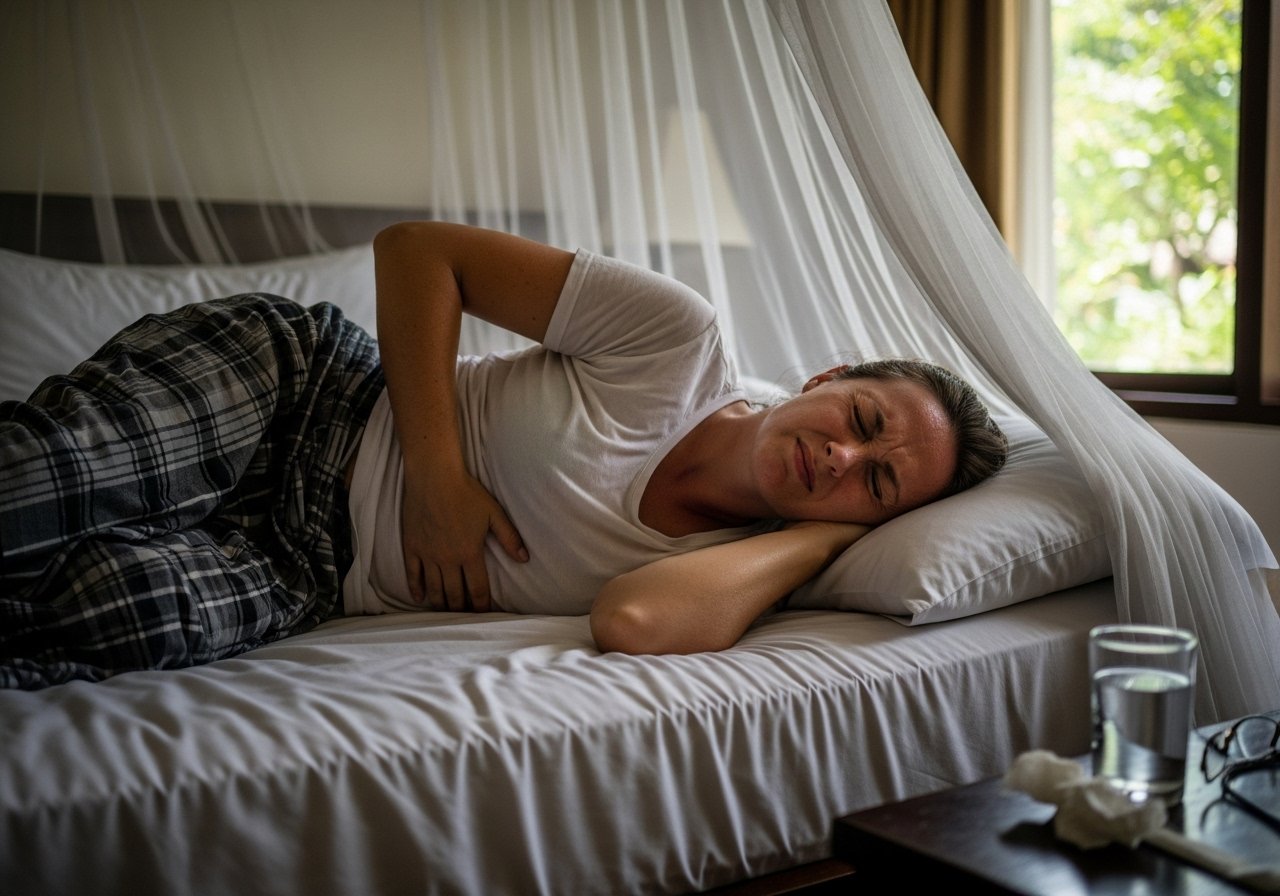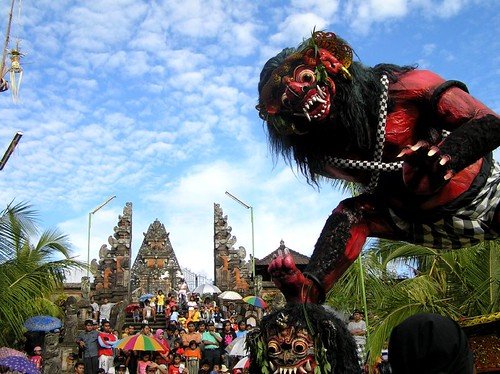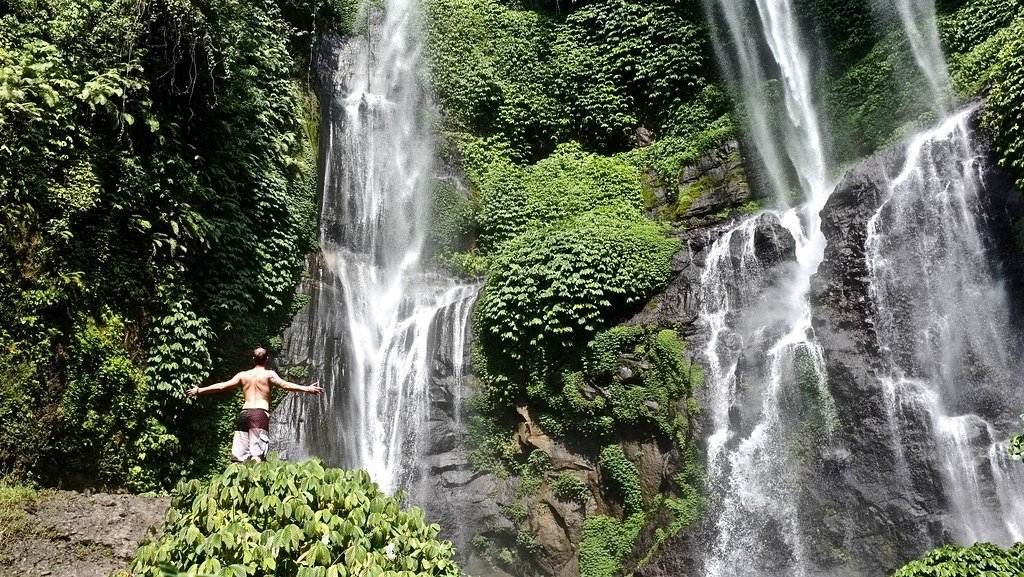Dengue is a real risk in Bali, but it’s also highly preventable. You don’t need to live in fear, you just need to be smart. Here is the real deal on protecting yourself, based on hard-won experience and advice from the doctors who treat dengue daily.
Understanding Your Enemy: The Aedes Mosquito
First, forget what you know about other mosquitoes. The one that carries dengue, the Aedes mosquito, is a different kind of threat.
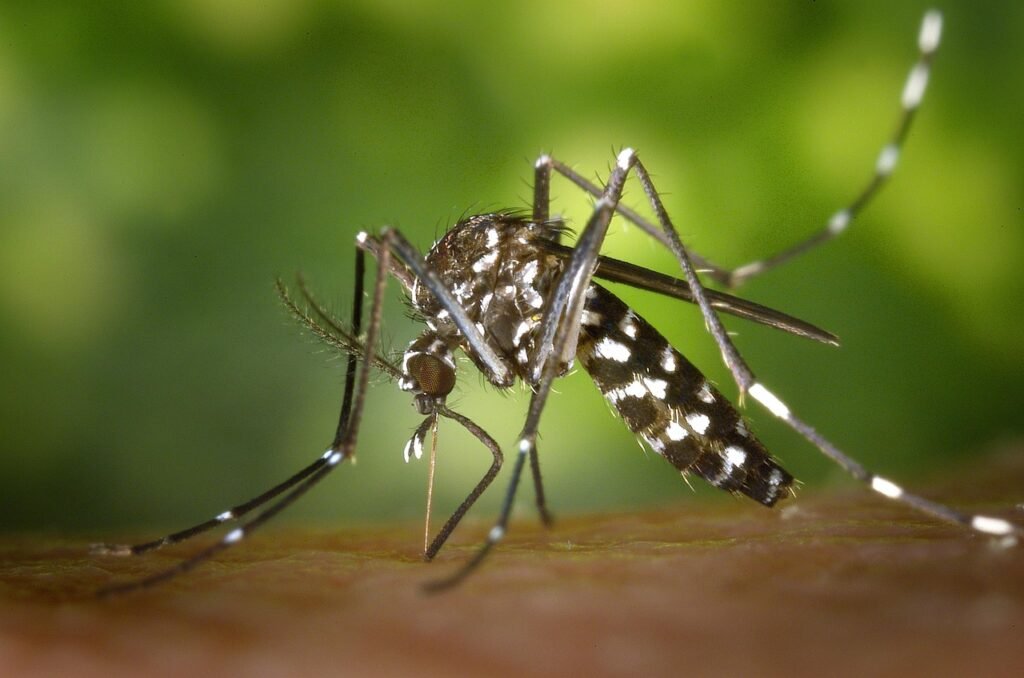
- Appearance: Easy to spot. It’s black with distinct white stripes on its legs and body.
- Active Hours: This is the most critical fact. They are day biters. Peak activity is at dawn (5:00 AM – 7:00 AM) and dusk (5:00 PM – 7:00 PM). That sunset yoga session or sunrise coffee on the patio? Prime dengue time.
- Habitat: They love clean, standing water—even tiny amounts. A flowerpot saucer, a discarded coconut shell, or a blocked gutter is a perfect nursery.
- Bite Pattern: They are sneaky. They usually go for ankles and legs, often biting multiple times in quick succession.
What Actually Works: Your Dengue Prevention Toolkit
This is your non-negotiable defense plan.
1. Repellents: The Gold Standard (DEET & Picaridin)
This is your single most effective tool.
- DEET-Based Repellents: In tropical conditions, DEET is the undisputed champion.
- Concentration: Look for 20-30% DEET. Anything less (like the common 13%) needs more frequent reapplication.
- Local Brands: Soffel is available in every Indomaret, Alfamart, and Apotek (pharmacy). It’s effective but usually has a lower DEET percentage (around 13%), so you must reapply it every 3-4 hours.
- Stronger Option: OFF! Deep Woods (25% DEET) is harder to find but worth it. For 30% DEET, you may need to bring it from home (e.g., Sawyer or REI brands).
- Picaridin Alternatives: This is the best DEET-free alternative, highly effective and better for sensitive skin or kids.
- Local Brands: Autan is a common brand found in larger pharmacies. You can also import Sawyer Picaridin.
How to Use Repellent Correctly:
- Apply it 20 minutes after you apply sunscreen (sunscreen first, repellent second).
- Cover all exposed skin. They will find the one spot you missed.
- Reapply every 4 hours, or more often if you are sweating heavily or after swimming.
2. The Right Clothing Strategy
Your clothes are a physical barrier.
- What Works:
- Light-colored, loose-fitting clothes. Mosquitoes are attracted to dark colors and can (and will) bite through tight clothing like yoga pants.
- Long pants, socks, and closed shoes during the peak dawn and dusk hours. They love ankles.
- Pro-Tip (Permethrin): You can buy permethrin spray at stores like Ace Hardware. Treat your clothes (not your skin) with it. One treatment lasts for several washes and is extremely effective.
3. Environmental Control (Your Villa or Hotel)
The Aedes mosquito only has a flight range of about 200 meters. This means if you’re getting bitten at your accommodation, the mosquito was likely “born” there.
- Do a daily “water check.”
- Empty plant saucers or fill them with sand.
- Check flower vases and change the water every 2-3 days.
- Clear blocked gutters and drains.
- Cover any water storage tanks or buckets.
- Remove any discarded tires, bottles, or coconut shells.
4. Physical Barriers (Coils, Nets, and Rackets)
- Mosquito Coils: Perfect for outdoor areas like your balcony or restaurant table, especially at sunset.
- Best Brands: Baygon (the green one) is the strongest. Hit is also very effective.
- Mosquito Nets: Essential if you sleep with windows open. Also great for napping during the day.
- Electric Rackets: Immensely satisfying for “active defense” against any mosquitoes that get inside your room.
❌ What Doesn’t Work: Myths & Money-Wasters
I’ve tried them all. Save your money and your health.
- Natural Remedies (Citronella, Lemongrass, Essential Oils): Sorry, but these do not work reliably in Bali. They might provide 20-30 minutes of very mild protection before the humidity and sweat render them useless. They are not a substitute for DEET or Picaridin.
- Vitamin B Patches & Garlic: A complete myth. There is zero scientific evidence for this.
- Electronic Devices (Ultrasonic Repellers, UV Zappers, Phone Apps): These are proven scams. UV zappers kill moths and other beneficial insects but rarely attract the Aedes mosquito.
- Incomplete Strategies:
- “I’m safe in my AC room.” (The mosquito flew in with you when you opened the door.)
- “I only use repellent at night.” (You missed the dengue mosquito’s peak hours.)
- “My hotel sprays.” (Fogging helps, but it’s not enough on its own.)
Risk Assessment: Where & When to Be Extra Cautious
Not all of Bali has the same risk level.
| Factor | High-Risk | Lower-Risk |
| Season | Rainy Season (December – March) | Dry Season (June – September) |
| Location | Denpasar, residential areas, construction sites, traditional markets | Beachfronts (windy), higher elevations (e.g., Bedugul, Munduk) |
| Time | 5:00 AM – 7:00 AM and 5:00 PM – 7:00 PM | Mid-day (8:00 AM – 4:00 PM), but risk is never zero. |
What to Do If You Think You Have Dengue
If you get sick, the key is to act fast.
1. Recognize the Classic Symptoms
- Sudden high fever (e.g., 40°C / 104°F)
- Severe headache, especially a unique pain behind the eyes
- Severe joint and muscle pain (its nickname is “breakbone fever”)
- Nausea and vomiting
- Extreme fatigue
- A skin rash that often appears on day 3 or 4
2. Watch for Warning Signs (Go to a Hospital Immediately)
This is the “critical phase,” when the fever drops but the danger increases.
- Severe abdominal pain
- Persistent vomiting (can’t keep fluids down)
- Bleeding from your gums or nose
- Blood in your vomit or stool
- Cold, clammy skin
- Difficulty breathing
3. Your Action Plan
- See a Doctor: Within 24 hours of a high fever, go to a clinic to get a blood test (specifically the NS1 antigen test) to confirm dengue.
- Hydrate Aggressively: This is the primary treatment. Drink water, coconut water, and oral rehydration salts.
- Monitor Your Platelet Count: You will need daily blood tests to watch your platelet count.
- Rest Completely: Do not try to “work through it.”
- Critical Warning: DO NOT TAKE ASPIRIN OR IBUPROFEN (Advil, Nurofen). These are blood thinners and can increase the risk of hemorrhage. Stick to Paracetamol (Panadol) for the fever and pain.
Recommended Medical Resources
- Best Hospitals:
- BIMC Hospital Nusa Dua (highly experienced with tourists and dengue)
- Kasih Ibu Hospital (Denpasar)
- Siloam Hospital (Denpasar)
- Apps: You can use the HaloDoc app to get a doctor to come to your villa for the initial consultation and blood test.
🗓️ A Simple Daily Prevention Routine
Dengue prevention is about consistent habits.
- Morning (5:00-7:00 AM): Before your morning coffee, apply DEET. Wear long pants if you’re sitting on the balcony.
- Daytime: Reapply repellent after swimming or sweating.
- Evening (5:00 PM): This is the crucial one. Re-apply your repellent for the sunset hours. Light mosquito coils on your patio. Change into long, loose-fitting pants.
- Night: Check your room for mosquitoes before bed. Use the AC or a mosquito net.
The Bottom Line
I learned the hard way that dengue is miserable, but I also learned that it’s avoidable. Your odds improve dramatically with the right precautions.
Take it seriously, but don’t let it paralyze you. Be smart, be prepared, and enjoy this incredible island.
Remember: 10 minutes of prevention beats 10 days of dengue recovery every time.
FAQ: Dengue Prevention in Bali
1. What is the biggest Dengue risk in Bali?
The main risk comes from Aedes mosquitoes that bite during the day. They are most active around sunrise and sunset.
2. How can I avoid Dengue bites in Bali?
Use a strong repellent with DEET or Picaridin, cover your skin, and avoid sitting outside during peak biting hours.
3. Which Dengue repellents actually work in Bali?
Repellents with 20–30 percent DEET or Picaridin work best. Reapply every few hours, especially if you sweat or swim.
4. Do natural products protect against Dengue?
Not really. Citronella and essential oils fade fast in Bali’s humidity and don’t give real protection.
5. What clothing helps prevent Dengue?
Light, loose, long clothing helps. Mosquitoes bite through tight fabrics, so skip leggings at dawn and dusk.
6. How can I keep Dengue mosquitoes out of my villa?
Remove standing water, use coils in outdoor areas, and keep windows closed or screened.
7. Do hotels spraying the area stop Dengue?
Fogging helps but isn’t enough on its own. You still need repellent on your skin every day.
8. Which places in Bali have higher Dengue risk?
Low-lying and crowded areas like Denpasar and spots with lots of standing water carry more risk. Beachfronts and higher hills usually have fewer mosquitoes.
9. What Dengue symptoms should I watch for?
Sudden high fever, headache behind the eyes, body pain, nausea, and a rash. These often show up fast.
10. When should I see a doctor for possible Dengue?
If you have high fever for a day or notice warning signs like stomach pain, vomiting, or bleeding, go to a clinic right away.
11. Can I take painkillers if I think it’s Dengue?
Use paracetamol only. Avoid ibuprofen and aspirin because they increase bleeding risk.
12. How is Dengue confirmed in Bali?
Clinics run an NS1 antigen test. It’s quick and usually gives a same-day result.
13. What should I do at home if I have Dengue?
Rest, drink a lot of fluids, and get daily blood tests to check your platelets.
14. Can Dengue be prevented with daily habits?
Yes. A few minutes each morning and evening with repellent and simple checks around your villa cut your risk a lot.
15. Do mosquitoes that spread Dengue bite at night?
They bite mostly in the day, especially at dawn and dusk. Nighttime is lower risk but not zero.
